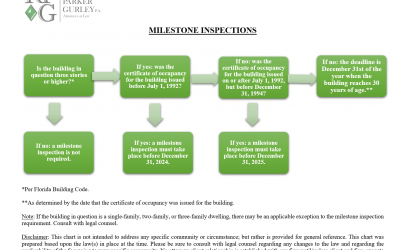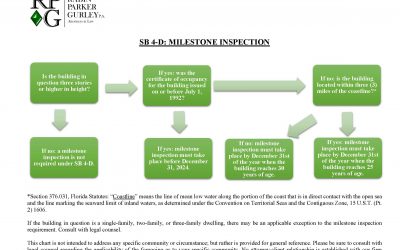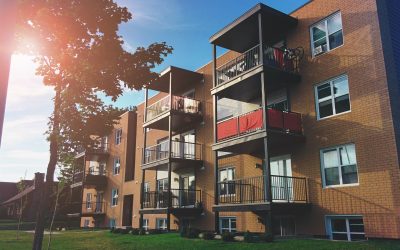FLORIDA’S CONSTRUCTION DEFECT STATUTE:
Chapter 558 of the Florida Statutes broadly governs “construction disputes”. The Statute generally requires that owners (i.e., associations) provide pre-suit notice to developers, contractors, subcontractors, material suppliers and/or design professionals before the commencement of legal action against any of the aforementioned parties in connection with an allege construction defect. The aforementioned notice must describe in “reasonable detail” the defect(s) at issue so that the party in receipt of the notice may reasonably ascertain the location/scope of the defects. The notice must also list the damage or loss resulting from the defect(s), if known.
What is a “Construction Defect”:
Chapter 558 applies to claims stemming from an alleged construction defect. Section 558.002(5), F.S., defines a “construction defect” as follows:
“[A] deficiency in, or a deficiency arising out of, the design, specifications, surveying, planning, supervision, observation of construction, or construction, repair, alteration, or remodeling of real property resulting from:
(a) Defective material, products, or components used in the construction or remodeling;
(b) A violation of the applicable codes in effect at the time of construction or remodeling which gives rise to a cause of action pursuant to s. 553.84;
(c) A failure of the design of real property to meet the applicable professional standards of care at the time of governmental approval; or
(d) A failure to construct or remodel real property in accordance with accepted trade standards for good and workmanlike construction at the time of construction.”
The foregoing definition is fairly broad, and is likely to encompass most claims stemming from improvements or repairs to real property.
Notice Requirements / Deadlines:
The following notice requirements apply to “construction disputes” under Ch. 558 (for associations with 20 or more parcels):
- The association must serve notice of any alleged defect(s) at least 120 days prior to filing suit or prior filing an arbitration action;
- Following the initial notice, the contractor has 50 days to request an inspection of the alleged defect(s);
- The contractor has 75 days from the date of the initial notice to formally respond to the notice. The contractor’s response may include an offer to perform repairs, an offer to fund all or a portion of the repairs, or may simply state that the contractor denies all liability.
- The association has 45 days to respond to the contractor’s offer if the contractor submits an offer as outlined in the preceding paragraph. The association need not accept the contractor’s offer.
[**see caveat below regarding deadlines**]
This foregoing timeline does not account for “downstream” subcontractors and suppliers. Section 558.004(3), F.S., permits a contractor who is in receipt of a 558 notice to “forward a copy of the notice of claim to each contractor, subcontractor, supplier, or design professional whom it reasonably believes is responsible for each defect specified in the notice of claim and shall note the specific defect for which it believes the particular contractor, subcontractor, supplier, or design professional is responsible.” Click the link at the bottom of this page to review deadlines associated with “downstream” subcontractors and suppliers.
For consideration:
- Boards of directors should take care to discuss with legal counsel prior to repairing any alleged defects. The failure to provide adequate notice to a developer, contractor, subcontractor, material supplier and/or design professional prior to moving forward with repairs may be deemed a violation of Ch. 558 and/or may amount to spoliation of evidence. Note, however, that Ch. 558 does provide an exception for “necessary emergency repairs” – but any determination as to whether the repairs at issue constitute “emergency” repairs should be reviewed on a case by case basis with the assistance of legal counsel.
- When submitting construction contracts to the association’s legal counsel for review prior to execution, discuss whether it may be beneficial to include an “opt out” provision whereby the parties mutually agree to opt out of the notice requirements set forth in Ch. 558.
- Finally, since it will likely take months before the aggrieved association is in a position to commence legal action in connection with a construction defect claim, it is critically important to involve legal counsel as early in the process as possible. This is particularly true where the defects at issue are likely to cause additional damage to surrounding areas. Your counsel will be able to guide you down the path of balancing the notice requirements set forth in Ch. 558 with the need for timely repairs (and the need to prevent further damage).
**The above-listed deadlines apply to associations representing more than 20 parcels. If your community is comprised of 20 parcels or less, check the Statute via the link below to review the applicable deadlines.**
https://www.flsenate.gov/Laws/Statutes/2018/Chapter558/All
- RPG LAW’S 2024 LEGISLATIVE UPDATE
- Navigating Competitive Bidding Requirements for Florida Community Associations
- RPG Law – Recent Case Results:
- RPG Law’s New Streamlined Assessment Recovery Solution – A “No Fee” Collection/Foreclosure Policy:
- Updated Milestone Inspection Flow Chart





